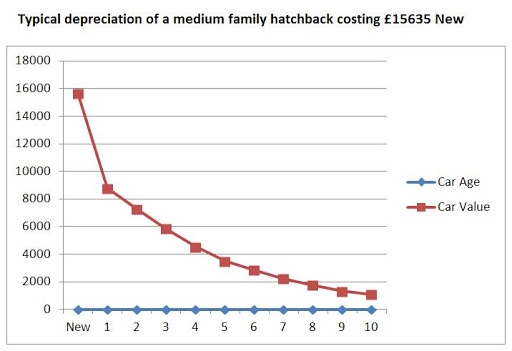- Carmoola
- Blog
- Cars and Gadgets
- How Fast Do Cars Depreciate?
- 🗞 Cars and Gadgets
- Last updated: Apr 18, 2024
- 6 Min Read
How Fast Do Cars Depreciate?
Written by

Verified by


See how much you can borrow in 60 seconds
| Representative Example | |
|---|---|
| Loan amount | £10,000 |
| Interest rate | 13.9% APR |
| 54 payments of | £246 |
| Total cost of credit | £3,284 |
| Option to purchase fee | £1 |
| Total payable | £13,285 |
Considering a new car purchase but concerned about depreciation? 🤔 A vehicle's value declines rapidly once you drive it off the dealership forecourt. Though it's an unfortunate aspect of owning a new car, it's essential to understand the rate at which new cars depreciate so you can make an informed decision about your next vehicle purchase, new or used.
What is depreciation?
Car depreciation is the difference between a vehicle's original purchase price and its depreciated value over time. As soon as you acquire the vehicle, it starts to diminish in value.
Vehicles depreciate due to the natural wear and tear they experience throughout their lifespan, as they navigate various road types, weather conditions, and are utilised in different ways. In comparison to other high-priced possessions, cars endure significant wear. So it's a good idea to pay attention to regular maintenance and servicing and keep your pride and joy in tip top condition as far as you can!
To illustrate, let's say you purchase the newest smartphone for £500. Over time, scratches and other marks from regular usage will decrease its value. Additionally, within a year, your smartphone will no longer be the latest model on the market. Consequently, it won't retain its original purchase price. Cars follow a similar pattern, but of course cost much more than your typical smartphone.
How much value does a car lose?
During the first year of car ownership, the vehicle's value significantly declines. The depreciation rate is closely tied to its original cost, which can be broken down into three components for clarity.
First, there's the wholesale or factory price, which is what the car dealer pays to acquire the vehicle from the manufacturer. Next is the suggested retail price, which is the price car manufacturers recommend for selling the vehicle to consumers.
Finally, the retail price is the amount you, as a buyer, would pay to purchase the car from the dealer. This price includes the dealer's markup, typically ranging from 5% to 10% of the factory price.
Ultimately, it comes down to the car make and model, but it's not uncommon for a car to lose as much as 20% of its value during the first year and 40-60% of its original value by the end of three years.
Car depreciation during the first year
As soon as you sit in the car, turn the key and start the engine, its value will decrease from the retail price. If you're lucky, it will likely depreciate by about 5% to 10%, bringing it back to its original factory price. Throughout the first year of ownership, the car's value will continue to drop by around 15% to 25%, with further depreciation occurring in the following years.
Given this information, does that make cars a poor investment? Depreciation is a primary reason why some buyers opt for second-hand vehicles, as they want to bypass the substantial decrease in value that occurs during the first year. Nonetheless, depreciation is virtually unavoidable for any vehicle over time. There are exceptions, such as luxury or vintage collectable cars, which may appreciate in value over the years. However, these vehicles typically come with a significant price tag.
Fastest depreciating cars in the UK
The depreciation rate is not the same for all vehicles. There are some that lose their value quicker while others depreciate at a slower pace. Brand-new cars don’t retain their value for long because of the markups car dealers add to the factory price. That’s why as soon as you leave the dealership, the car loses a lot of its value compared to second-hand vehicles.
If you get a car that's in low demand, it would also lose its value quickly because, quite frankly, no one wants it. Naturally, cars that are high in demand are more valuable and can retain their value much longer. It's wise to choose a more sought-after model if you want to reduce the rate of car depreciation.
Think about whether the model you're buying has the extras people will look for in a vehicle, like a high-level infotainment system? Things like heated seats, sunroof and parking sensors can all help to maintain the value (and demand) of your car if you want to sell it in the future. In the UK, here are the 10 most popular car colours.
Most popular new car colours in the UK in 2023
- Grey
- Black
- White
- Blue
- Red
- Silver
- Green
- Orange
- Yellow
- Bronze
Still want to get that bronze car?
Source: Society of Motor Manufacturers and Traders (SMMT) press release 'New car colours 2023'
Cars that depreciate the slowest
Fuel-efficient cars are on top of the list, with many drivers are looking for cost-effective cars. You may consider getting an electric car because they have slower depreciation rates than many petrol guzzlers. Also, cheaper vehicles don’t lose theirs as value fast. And since they’re more affordable, they’re also popular among car buyers.
How fast do second-hand cars depreciate?
Many buyers opt against purchasing a brand-new car to avoid the dreaded downward car depreciation curve from the first year. Depreciation, however, is inescapable, even for used vehicles, with the car's age determining the rate at which it loses value.
Purchasing a nearly new or one to two-year-old car can help evade the rapid depreciation experienced by brand new vehicles. A five-year-old second-hand car won't lose as much value, but keep in mind that older cars typically require more repairs and have more maintenance-related expenses.
When a car is eight years old or older, it has likely reached its maximum depreciation. It's good to carefully consider whether you're willing to risk buying a car of this age due to potential repair costs. Alternatively, you might save more with a brand new car despite its first-year depreciation. It's a factor worth contemplating.
We found this cool car depreciation calculator that you might like to check out to compare some of the cars you might be looking at buying.
Here's a car depreciation table showing an example of a depreciation curve from freecarvaluations.co.uk

Driving down the road of depreciation
There are ways to minimise your car’s depreciation. Make sure that it's maintained and serviced regularly. If there’s any damage, have it fixed sooner rather than later. If you can, keep your mileage to a minimum. You may also choose to buy a nearly-new second-hand car to avoid fast depreciation. Don’t forget to do your research on the car’s value before you buy it. And when you’re choosing a car, try to avoid unpopular colours.
If you feel that you’d rather not deal with all this issue of car depreciation, there’s a solution for that. You can always lease a car rather than buy one. You don’t have to worry about all the devaluation. And when your lease contract ends after a couple of years, you can get a newer car. It really depends on your specific circumstances 👍
See how much you can borrow in 60 seconds
| Representative Example | |
|---|---|
| Loan amount | £10,000 |
| Interest rate | 13.9% APR |
| 54 payments of | £246 |
| Total cost of credit | £3,284 |
| Option to purchase fee | £1 |
| Total payable | £13,285 |
Related articles
Can you drive in the UK on a foreign licence?
If you’re new to the UK, you might be keen to get behind the wheel to explore on the open road. You can usually drive in the UK...
What happens if my car is written off and it’s still on finance?
Accidents happen. When split-second decisions and challenging conditions make driving difficult at the best of times, even the...
Which credit reference agencies do lenders use?
When applying for car finance, your credit score can make a significant difference to the APR you’re offered, your repayment...

.webp?width=832&height=592&name=customer-support%20(1).webp)










.webp?width=400&height=285&name=online-shoppers-with-dog%20(1).webp)


.jpg?width=500&height=356&name=Vintage%20car%20going%20to%20an%20old%20town-1%20(1).jpg)





